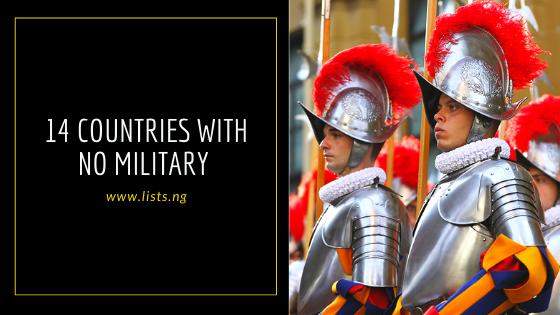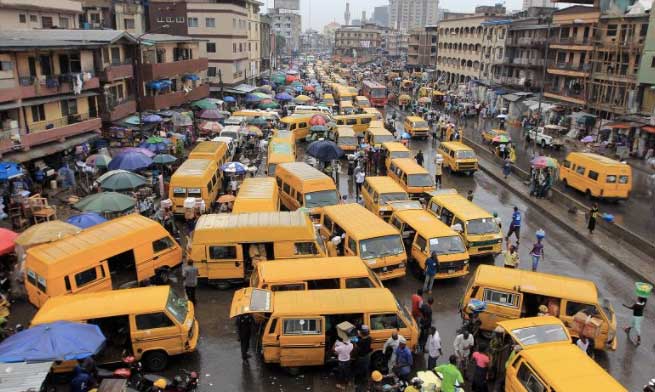Functions of the army usually include maintaining the territorial integrity of a country, defending a country from external aggression, protecting a country’s borders, etc. With constant military threats and alliance shifts, having a strong army has become necessary, and countries continue to advance their military capabilities, both in terms of personnel and technology. More so the strength and capacity of a state’s military is often used to determine its power in the international system.
Having established the importance of the military, not every country in the world possess standing armies. Some countries are just too small, therefore rely on other bigger countries for their defence while others do not often face external aggression, hence find it surplus to requirement.
Below are the 14 countries of the world without armed forces.
1. Andora
Andorra has no standing army but signed treaties with Spain and France for its protection. The basic principle of Andorran defence is that all able-bodied men are available to fight if called upon by the sounding of the Sometent. Its small volunteer army is purely ceremonial in function. The army’s role in internal security was largely taken over by the formation of the Police Corps of Andorra in 1931. The paramilitary GIPA (trained in counter-terrorism and hostage management) is part of the national police.
2. Dominica
Dominica has not had a standing army since 1981. Defense is the responsibility of the Regional Security System. The civil Commonwealth of Dominica Police Force includes a Special Service Unit, Coast Guard. According to the country’s Police Act, Chapter 14:01: In the event of war or other emergency, if proclaimed by the authorities, the Police Force shall be a military force which may be employed for State defence.
3. Grenada
The caribbean state has not had a standing army since the 1983 disbandment of the People’s Revolutionary Army, after the US-led invasion. The Royal Grenada Police Force maintains a paramilitary special service unit for internal security purposes. Defense is the responsibility of the Regional Security System.
4. Kiribati
The only forces permitted in this country of 110,000are the police, which includes a Maritime Surveillance Unit for internal security. The Maritime Surveillance is equipped with small arms, and maintains one Pacific-class patrol boat, the Teanoai. Defense assistance is provided by Australia and New Zealand under an informal agreement between the three countries.
5. Liechtenstein
Liechtenstein is one of the countries with the lowest crime rates in the world, but has no standing army. The army was abolished in 1868 because it was deemed too costly. An army is only permitted in times of war, but Liechtenstein is not under any threat from anyone.. Liechtenstein maintains a police force with a police tactical unit, equipped with small arms to carry out internal security duties. Defense assistance is provided by Austria and Switzerland under an informal agreement among the three countries.
6. Marshall Islands
The police, which includes a Maritime Surveillance Unit are the only armed forces allowed in Marshall islands since its formation. The Maritime Surveillance Unit is equipped with small arms, and maintains one Pacific-class patrol boat, the Lomor. Under the Compact of Free Association, defense is the responsibility of the United States.
7. Federated States of Micronesia
Under the Compact of Free AssociationUnited States, defense of Micronesia is the responsibility of the United States and it doesn’t maintain an army. Internal security is the responsibility of the police, which maintain a Maritime Surveillance Unit.
8. Nauru
Nauru maintains a relatively large armed police force, and an auxiliary police force for internal security. However, per an informals agreement, Australia is responsible for Nauru’s defense.
9. Palau
Since the country’s foundation the only forces permitted are the police, which also includes a 30-person Maritime Surveillance Unit for internal security. Defense assistance is provided by the United States under the Compact of Free Association.
10. Saint Lucia
The Royal Saint Lucia Police maintain two small paramilitary forces consisting of 116 people, the Special Service Unit, and the Coast Guard, both units are responsible for internal security. Defense is the responsibility of the Regional Security System, an international agreement for the defence and security of the eastern Caribbean region.
11. Saint Vincent and Grenadines
The Royal Saint Vincent and the Grenadines Police Force maintain two small paramilitary forces consisting of 94 people, called the Special Service Unit, and the Coast Guard. Both units are responsible for internal security purposes. Like Saint Luca, defense is the responsibility of the Regional Security System.
12. Samoa
The island of Samoa only has a small police force, and a Maritime Surveillance Unit for internal security. The Maritime Surveillance Unit is equipped with small arms, and maintains one Pacific-class patrol boat, the Nafanua. In accordance with a 1962 Treaty of Friendship, New Zealand is responsible for defense.
13. Tuvalu
Since the country’s foundation no military has been formed; however, there is a small police force, and a Maritime Surveillance Unit for internal security. The Maritime Surveillance Unit is equipped with small arms, and maintains one Pacific-class patrol boat, the Te Mataili.
14. Vatican city
The Vatican City State maintains a Gendarmerie Corps for internal policing. The corps is responsible for security, public order, border control, traffic control, criminal investigation, and other general police duties in Vatican City including providing security for the Pope outside of Vatican City. The Pontifical Swiss Guard is an armed unit that acts as the Pope’s personal bodyguard. As the Vatican City is an enclave within Italy, its military defence is provided by the Italian Armed Forces. However, there is no formal defence treaty with Italy, as the Vatican City is a neutral state.



